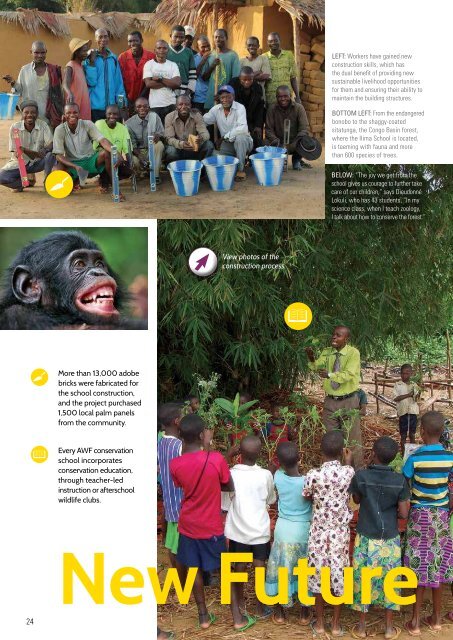awf-2014-report
awf-2014-report
awf-2014-report
Create successful ePaper yourself
Turn your PDF publications into a flip-book with our unique Google optimized e-Paper software.
More than 13,000 adobe<br />
bricks were fabricated for<br />
the school construction,<br />
and the project purchased<br />
1,500 local palm panels<br />
from the community.<br />
Every AWF conservation<br />
school incorporates<br />
conservation education,<br />
through teacher-led<br />
instruction or afterschool<br />
wildlife clubs.<br />
View photos of the<br />
construction process.<br />
Left: Workers have gained new<br />
construction skills, which has<br />
the dual benefit of providing new<br />
sustainable livelihood opportunities<br />
for them and ensuring their ability to<br />
maintain the building structures.<br />
Bottom Left: From the endangered<br />
bonobo to the shaggy-coated<br />
sitatunga, the Congo Basin forest,<br />
where the Ilima School is located,<br />
is teeming with fauna and more<br />
than 600 species of trees.<br />
Below: “The joy we get from the<br />
school gives us courage to further take<br />
care of our children,” says Dieudonné<br />
Lokuli, who has 43 students. “In my<br />
science class, when I teach zoology,<br />
I talk about how to conserve the forest.”<br />
New Future<br />
On Africa’s Future,<br />
by Africa’s Future<br />
If the passionate professionals who make up AWF’s<br />
Conservation Management Training Program (CMTP)<br />
are the future of conservation, then Africa is in good<br />
hands. Kenya’s Robina Abuya, Sylvia Wasige and Eric<br />
Reson; Cameroon’s Muyang Achah and Henriatha Che;<br />
and Nigeria’s Elizabeth Babalola started in July <strong>2014</strong> as<br />
the newest class of AWF’s rigorous mentoring program<br />
for African conservationists. Below, some of the new<br />
trainees, along with trainees Sarah<br />
Chiles and Edwin Tambara from<br />
the previous class, discussed their<br />
outlook on conservation.<br />
What prompted you to choose<br />
a career in conservation?<br />
Robina: One person who really<br />
motivated me was Wangari<br />
Maathai. I ended up buying most<br />
of her books and reading a lot<br />
about her. When she was given<br />
the Nobel Peace Prize, I thought,<br />
“I want to be like her.”<br />
Elizabeth: For me, it was seeing<br />
pictures on TV of people’s<br />
farmlands completely drenched<br />
in oil [from the oil spills in the<br />
Niger Delta]. I asked myself,<br />
“What were we doing that let<br />
that happen?”<br />
Sylvia: When I was growing up<br />
I’d see the Kenya Wildlife Service<br />
rangers all dressed up in jungle<br />
outfits—[laughter]—and that was<br />
something for me! At university,<br />
I [pursued a degree in] wildlife<br />
management. My uncle said to me,<br />
“Wildlife, what is there to manage?”<br />
Because I come from Bungoma, where actually there’s<br />
no wildlife left.<br />
I thought, if this is my uncle and he has that kind of view<br />
about wildlife, what about other people who’ve not had<br />
a chance to experience it? That’s where I got the passion.<br />
Is it unreasonable to expect struggling local<br />
communities to prioritize wildlife protection?<br />
Sarah: My sense is that communities are not antiwildlife<br />
conservation per se. It’s really that things like<br />
overpopulation and [human] migration have affected<br />
the way communities are structured. Amongst the<br />
Maasai, for instance, there was a communal sense<br />
of ownership around cattle. Now there’s more of<br />
an independent sense of ownership, so now each man<br />
would like cattle. And that has a number of consequences.<br />
How do we address that?<br />
You are helping to ensure that the next generation<br />
of African conservation leaders are well-prepared.<br />
Pictured are: (front row, l – r) Sylvia Wasige, Robina<br />
Abuya and Henriatha Che; (back row) Elizabeth Babalola,<br />
Sarah Chiles, Eric Reson and Muyang Achah.<br />
Eric: We all accept as conservationists that it’s really<br />
challenging to conserve wildlife and natural resources.<br />
But the best way we can go about it is—we have a saying<br />
in my country, “Knowledge<br />
troubles.” If you have knowledge<br />
about something, then you’ll be<br />
troubled [and do something about<br />
it]. We need to educate people,<br />
to trouble them.<br />
What are you hoping to get<br />
from CMTP?<br />
Elizabeth: I am hoping for an Africawide<br />
experience. I really want to<br />
learn what is working and what isn’t<br />
working in other African countries.<br />
Robina: You experience barriers in<br />
subject areas where you’ve trained.<br />
So I’m hoping to uninstall—<br />
[laughter]—what I already have<br />
in my hard drive and install new<br />
information.<br />
Edwin: Or maybe just a system<br />
update. [laughter]<br />
Sylvia: So far, most of my life<br />
has only been academic—I know<br />
things on paper. Now I really<br />
want an opportunity to see<br />
[what I’ve learned] in practice.<br />
From the old CMTP guys,<br />
any words of wisdom or advice for the new class?<br />
Edwin: CMTP is quite an opportunity. You are interacting<br />
with people who are at the highest levels in conservation.<br />
You get to hear about where the future of conservation<br />
is going.<br />
Sometimes, they might be throwing you into the deep<br />
end because they will have recognized your capabilities.<br />
So you’ll get tested. But, I’m already in a position where<br />
I can influence conservation decisions in South Sudan,<br />
in Uganda, in Tanzania. I don’t think many people have<br />
that opportunity to be able to contribute to conservation<br />
at that level so early in their career.<br />
Read the full roundtable discussion.<br />
24<br />
25


